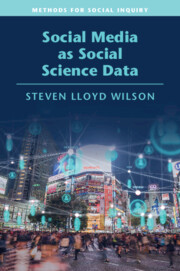Refine search
Actions for selected content:
6 results
Introduction
-
- Book:
- Killing the Messenger
- Published online:
- 05 September 2025
- Print publication:
- 25 September 2025, pp 1-8
-
- Chapter
-
- You have access
- Open access
- HTML
- Export citation
7 - Earnings Inequality, Power Bias, and Mismatch
-
- Book:
- Structuralist and Behavioral Macroeconomics
- Published online:
- 10 November 2023
- Print publication:
- 21 September 2023, pp 173-202
-
- Chapter
- Export citation
1 - Why Social Media Matters to the Social Sciences
-
- Book:
- Social Media as Social Science Data
- Published online:
- 03 November 2022
- Print publication:
- 17 November 2022, pp 1-9
-
- Chapter
- Export citation

Social Media as Social Science Data
-
- Published online:
- 03 November 2022
- Print publication:
- 17 November 2022
Chapter 3 - Technologies of Proximity
-
- Book:
- Dear John
- Published online:
- 04 January 2022
- Print publication:
- 06 January 2022, pp 86-113
-
- Chapter
- Export citation
19 - Education for Transformation
- from Part IV - Cross-Cutting Issues
-
- Book:
- Global Governance and the Emergence of Global Institutions for the 21st Century
- Published online:
- 18 January 2020
- Print publication:
- 23 January 2020, pp 411-430
-
- Chapter
-
- You have access
- Open access
- HTML
- Export citation
